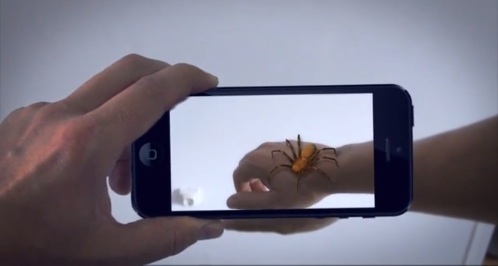 Phobious's augmented reality app.
Phobious's augmented reality app.
Correction: A previous version of this story identified this as DreamIt's third class, rather than it's second.
DreamIt Health, a relative newcomer to the digital health incubator scene, has proven itself no slouch at recruiting big name provider partners. It launched its first Philadelphia-based class with the support of Independence Blue Cross and Penn Medicine and brought on Johns Hopkins for its second class, based in Baltimore, last fall. Now the incubator is adding provider and payor Kaiser Permanente as an additional strategic partner. Northrop Grumman will also support the class.
As in last year's program, companies will have access to a working space, up to $50,000 per team for living expenses, and access to a range of professional and legal services in exchange for an 8 percent stake in the company. That’s in addition to DreamIt’s signature offerings: one-on-one mentorship and introductions to local and national payors and providers.
DreamIt says the four-month program "is designed to help the companies rapidly find product-market fit, achieve key business milestones and remove obstacles otherwise in the path of their success in delivering new products and services that target meaningful problems."
Here's the nine classes in DreamIt's second Baltimore class:
Aegle
DreamIt describes this startup only as working on "wearable biometric devices," but the Baltimore-based company is almost certainly the same Aegle MobiHealthNews wrote about in our roundup of Tricorder X Prize entrants. (UPDATE: Aegle sent MobiHealthNews an email to clarify that the Tricorder team is now called Aezon and the startup formed around a subset of that team's technology is Aegle. Also, the team is made up of undergraduate students not graduate students as MobiHealthNews incorrectly stated in the original version of this article.)
Led by Tatiana Rypinski, Aegle Johns Hopkins Tricorder X Prize team. The team’s approach includes a cloud infrastructure, which uses Blueprint Health-backed Symcat for symptom evaluation; a wearable device for continuous vitals monitoring; a modular, Bluetooth-enabled lab box for additional tests; and a smartphone app to act as the user interface for the system. The team is made up of undergraduate students from different Johns Hopkins University departments and partnered with the Center for BioEngineering Innovation and Design.
Avhana
Avhana, another Baltimore-based team, is working on "next-generation clinical decision support for the electronic health record." It's founded by two brothers, Noah, an EHR analyst, and Nate Weiner, a design engineer, both affiliated with Johns Hopkins.
Cognuse is an Estonian company focused on using mobile games to improve cognitive rehabilitation for patients recovering from strokes or other traumatic brain injuries. The company already previews some rehab games on its website. The games simulate everyday tasks like cooking and trip planning to test and strengthen mental tasks like sequencing, decision-making, and flexibility.
eMOCHA
eMOCHA was originally developed by the Johns Hopkins Center for Clinical Global Health Applications, and has now spun off into its own company. The name stands for "electronic Mobile Open-source Comprehensive Health Application" and DreamIt describes its mission as "mobile capture of data for medication adherence and clinical trials."
According to the Center, "eMOCHA is designed to leverage mobile phones to assist health programs, researchers, providers, and patients improve communication, education, patient care, and data collection. eMOCHA synergizes the power of mobile technology, Android-supported devices, video and audio files, and a server-based application to analyze and GPS-map large amounts of data, implement interactive multimedia training, and streamline data collection and analyses."
Protenus
Another Baltimore-based company, Protenus, is focused on "digital management of patient consent and other administrative workflows."
Respi
Greek company Respi is working on a Smartphone spirometer (a device used to measure breathing) and respiratory data platform.
Patient Feed
Patient Feed, based in Pittsburgh and New York, is working on a "collaboration tool for inpatient care" according to DreamIt.
Phobious is a Spanish company using mobile and augmented reality to treat behavioral health issues including, as the name suggests, phobias. The idea is to present virtual experiences on the app to desensitize users to the source of their fear. Fears currently advertised include flying, public speaking, dentists, needles, and sexuality.
The Smartphone Physical describes itself as a "large-scale demonstration of a series of smartphone-based devices that provide clinically relevant information," including many of the smartphone-connected medical devices MobiHealthNews has written about in the past. The company got plenty of media attention last year when it was featured at TEDMED. The devices were curated by the editors of MedGadget, while Nurture provided the exam room furniture for the exhibit.















